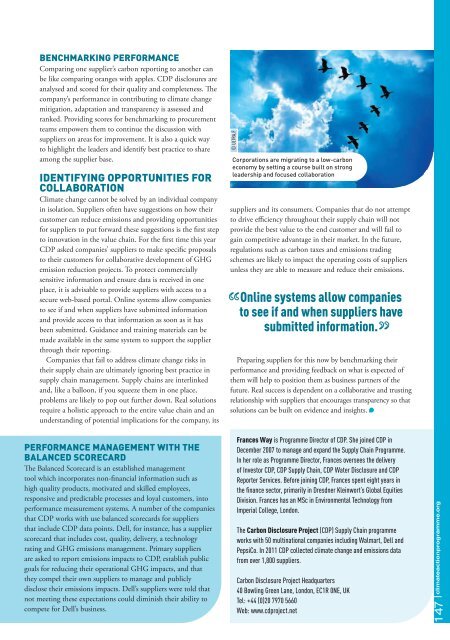Climate Action 2011-2012
Create successful ePaper yourself
Turn your PDF publications into a flip-book with our unique Google optimized e-Paper software.
BenchMarking perforMance<br />
Comparing one supplier’s carbon reporting to another can<br />
be like comparing oranges with apples. CDP disclosures are<br />
analysed and scored for their quality and completeness. The<br />
company’s performance in contributing to climate change<br />
mitigation, adaptation and transparency is assessed and<br />
ranked. Providing scores for benchmarking to procurement<br />
teams empowers them to continue the discussion with<br />
suppliers on areas for improvement. It is also a quick way<br />
to highlight the leaders and identify best practice to share<br />
among the supplier base.<br />
idenTifying opporTuniTies for<br />
collaBoraTion<br />
<strong>Climate</strong> change cannot be solved by an individual company<br />
in isolation. Suppliers often have suggestions on how their<br />
customer can reduce emissions and providing opportunities<br />
for suppliers to put forward these suggestions is the first step<br />
to innovation in the value chain. For the first time this year<br />
CDP asked companies’ suppliers to make specific proposals<br />
to their customers for collaborative development of GHG<br />
emission reduction projects. To protect commercially<br />
sensitive information and ensure data is received in one<br />
place, it is advisable to provide suppliers with access to a<br />
secure web-based portal. Online systems allow companies<br />
to see if and when suppliers have submitted information<br />
and provide access to that information as soon as it has<br />
been submitted. Guidance and training materials can be<br />
made available in the same system to support the supplier<br />
through their reporting.<br />
Companies that fail to address climate change risks in<br />
their supply chain are ultimately ignoring best practice in<br />
supply chain management. Supply chains are interlinked<br />
and, like a balloon, if you squeeze them in one place,<br />
problems are likely to pop out further down. Real solutions<br />
require a holistic approach to the entire value chain and an<br />
understanding of potential implications for the company, its<br />
© ULTRA.F<br />
Corporations are migrating to a low-carbon<br />
economy by setting a course built on strong<br />
leadership and focused collaboration<br />
suppliers and its consumers. Companies that do not attempt<br />
to drive efficiency throughout their supply chain will not<br />
provide the best value to the end customer and will fail to<br />
gain competitive advantage in their market. In the future,<br />
regulations such as carbon taxes and emissions trading<br />
schemes are likely to impact the operating costs of suppliers<br />
unless they are able to measure and reduce their emissions.<br />
Online systems allow companies<br />
to see if and when suppliers have<br />
submitted information.<br />
Preparing suppliers for this now by benchmarking their<br />
performance and providing feedback on what is expected of<br />
them will help to position them as business partners of the<br />
future. Real success is dependent on a collaborative and trusting<br />
relationship with suppliers that encourages transparency so that<br />
solutions can be built on evidence and insights.<br />
perforMance ManageMenT wiTh The<br />
Balanced scorecard<br />
The Balanced Scorecard is an established management<br />
tool which incorporates non-financial information such as<br />
high quality products, motivated and skilled employees,<br />
responsive and predictable processes and loyal customers, into<br />
performance measurement systems. A number of the companies<br />
that CDP works with use balanced scorecards for suppliers<br />
that include CDP data points. Dell, for instance, has a supplier<br />
scorecard that includes cost, quality, delivery, a technology<br />
rating and GHG emissions management. Primary suppliers<br />
are asked to report emissions impacts to CDP, establish public<br />
goals for reducing their operational GHG impacts, and that<br />
they compel their own suppliers to manage and publicly<br />
disclose their emissions impacts. Dell’s suppliers were told that<br />
not meeting these expectations could diminish their ability to<br />
compete for Dell’s business.<br />
Frances Way is Programme Director of CDP. She joined CDP in<br />
December 2007 to manage and expand the Supply Chain Programme.<br />
In her role as Programme Director, Frances oversees the delivery<br />
of Investor CDP, CDP Supply Chain, CDP Water Disclosure and CDP<br />
Reporter Services. Before joining CDP, Frances spent eight years in<br />
the finance sector, primarily in Dresdner Kleinwort’s Global Equities<br />
Division. Frances has an MSc in Environmental Technology from<br />
Imperial College, London.<br />
The Carbon Disclosure Project (CDP) Supply Chain programme<br />
works with 50 multinational companies including Walmart, Dell and<br />
PepsiCo. In <strong>2011</strong> CDP collected climate change and emissions data<br />
from over 1,800 suppliers.<br />
Carbon Disclosure Project Headquarters<br />
40 Bowling Green Lane, London, EC1R 0NE, UK<br />
Tel: +44 (0)20 7970 5660<br />
Web: www.cdproject.net<br />
147 climateactionprogramme.org












